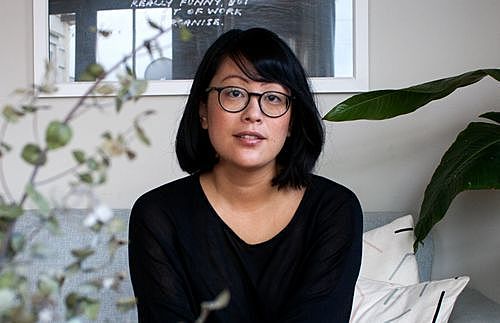Forget the glass ceiling, there’s asbestos in the walls
Ferocious, sharp and unapologetic, Boys Will Be Boys lays bare the toxic effects of corporate misogyny and asks its audience: are we okay with this?
Ferocious, sharp and unapologetic, Boys Will Be Boys lays bare the toxic effects of corporate misogyny and asks its audience: are we okay with this?
Please note: this essay discussess the ending of Boys Will Be Boys. If you're planning on seeing the show, read this after.
Melissa Bubnic heard a lot of stories when she was researching her play, Boys Will Be Boys. There was Kumiko (not her real name), a broker in her early twenties. She’d started her career in Japan, but had moved to London where – on her first day on the trading floor – her colleague called her a “rice-eating yellow cunt.” She complained to her manager, and he offered her some advice: “Don’t be such a fucking princess.”
“Another woman told me that her colleague needed to leave work early because her child was sick,” Melissa tells me. “Her boss said she could go if she flashed her breasts – and she did.” Another was advised to hide the fact that she was married, because it was important her clients saw her as available. “These are just a few anecdotes among many,” she warns, “but they’ve all found their way into the play.”
Boys Will Be Boys follows Astrid – a ruthless currency trader at the top of her game – and her young protégé Priya. They exist in an intoxicating world that’s giddy on excess and where winning means winning on someone else’s terms. In other words: play the game, but know your place.
“I was shocked,” Melissa says of the stories she was told. “It’s not that I don’t think sexism and racism are still an everyday problem, but these examples were so unapologetic, so obvious. I thought people had to be more covert with their bigotry these days.” As she delved deeper into the world of finance, she found the opposite to be true. Instead, “there seemed to be a celebration of wrong ‘humour’, of being as un-PC as possible.”
The play repulsed Silo Theatre artistic director Sophie Roberts when she first read it. “I had this violent reaction,” she says. “I was like: this is horrible. This world is horrible. These people are horrible.” And while there are exceptions to the rule, it reveals a pervasive corporate culture that – to some – is only getting worse. “The behaviour was more appalling in the ‘80s,” one broker told Melissa, “but people were less afraid of lawsuits, so more inclined to give women a chance.” Now, “women aren’t even getting through the door because they represent too much of a risk, a sexual discrimination suit waiting to happen.”
It’s this contemporary version of corporate culture that the play puts to its audience and asks: are we okay with this?
“I knew very early on that this was not a play about banking,” Melissa says, “but the world of it helped me tell a story about women and men.” Boys asks how women navigate misogyny when it’s built into the walls around them. What does success look like in a culture that treats women as currency, where unconscious biases mean men are more likely to be promoted on potential, and women on proven performance? Where women who know what they want are labelled ‘ruthless’, ‘aggressive’ or ‘difficult’? How do you balance being a parent when – even if you work somewhere that offers flexible working hours – using those basic entitlements is seen as a lack of commitment to the company?
“It’s not about why some men hate,” Melissa says of the play, “but about what the women who are in these environments have to do to survive.”
"It's not about why some men hate," Melissa says of the play, "but about what the women who are in these environments have to do to survive."
For Astrid, survival means understanding how her gender is valued and using it to her advantage. “A client calls you because you’re hot and he wants to be around hot women,” she explains to Priya. “He wants to flirt with you. He wants to fuck you. Don’t fuck them,” she advises, “but be fuckable.”
It’s not just women who navigate this environment either. In Boys, both Priya and Harrison have to re-learn how to perform their gender as part of their indoctrination into the firm. “I didn’t want [Harrison] to be a stereotypical jock,” Melissa says. “He’s not the high school quarterback, the fraternity dude, the obvious culprit. He’s entitled because of his wealth, privilege, gender and race – but he’s kind of a geek, and he’s bullied.” Time and time again, he’s punished for being different, while Priya is rewarded for the same traits he lacks. Both are sculpted – sometimes brutally, sometimes through near-invisible reinforcement – to succeed in a specific kind of world.
Taking on so-called ‘masculine’ traits is the only way Astrid sees herself succeeding in an industry built by, and for, men. “I’m basically a man who sits to pee,” she announces early on. She knows she can’t win in a culture where women have less value, so she’s distanced herself from her gender.
“She sees that in the world of men versus women, men always win,” Melissa comments. “So she’s decided to be a surrogate man.” But at what cost?
She knows she can’t win in a culture where women have less value, so she’s distanced herself from her gender.
In Melissa S. Fisher’s Wall Street Women, first-generation traders explain how, once they reached a senior position, they found themselves reluctant to adopt policies promoting gender and ethnic diversity. “They believed such efforts, in helping women advance, would single them out as ‘minorities’,” she writes, “a category they found undesirable. In many circumstances, they were reluctant to publicly align themselves with the idea that women and men were different, for difference was the grounds on which men denied them success and advancement.”
*
“My dad didn’t send me here to get people fired. He sent me here to make me. He started out as a bookie. He found it necessary.”
- Harrison
Instead of framing these boardroom battles as a ‘business problem’, Boys Will Be Boys shows how dangerously slippery those dynamics can be. The play had its start in 2011, when Sydney Theatre Company asked Melissa for her take on a recent incident where a cadet in the Australian Defence Force Academy had been filmed having sex without her knowledge. The footage was streamed via Skype into a nearby room full of her peers. The cadet reported the incident. In the weeks following, she was repeatedly harassed, had her room vandalised, and was advised by management to apologise to her colleagues for going to the media and bringing the Navy into disrepute.
Closer to home, we have the Chiefs: grown men, well-paid professional sports players, allegedly throwing gravel at a woman and groping her without her consent. Others have defended them. One of them was Margaret Comer. A trustee on the Waikato Women’s Refuge, she spoke on behalf of Chiefs’ sponsor, Gallagher. “If a woman takes her clothes off and walks around in a group of men,” she told New Zealand, “what are we supposed to do if one of them tries to touch her?” What are we to do if a woman ties her hair into a ponytail? And what if she straight-out says no?
When talkback hosts John Tamihere and Willie Jackson interviewed an 18-year-old friend of one of the victims of the Roast Busters, they told her she shouldn’t have been drinking and asked if rape was possible if the girls considered the boys “good-looking”. At Cannes this year, an Aspirin ad that simply boasted the text “Don’t worry babe, I’m not filming this.mov” was given a Bronze Lion. Not just ignored, or tacitly accepted, but publicly rewarded by an international panel of industry leaders.
“The performance of masculinity demands conformity to an ideal,” Melissa notes, and that ideal frames men as strong, sexually virile, and powerful. “Harrison does what he does to prove he’s one of the boys.” Not because he wants to be that ideal, but because it provides a shield from the abuse and harassment of his peers. “It’s not just ‘bad’ men who rape,” Melissa continues. She begins listing some of the many teen films that feature rape as a humorous plot device – Revenge of the Nerds, American Pie. “It’s a culture that doesn’t understand how consent operates.”
*
“I’m supposed to… be competent but not in a way that’s threatening. I’m supposed to be successful, but not want to be successful, not too much.”
- Priya
2016 is a landmark year for New Zealand. We currently have no female CEOs in our top 50 listed businesses, and our gender pay gap is the biggest it’s been in eight years, with women earning under 86c for every dollar that men do. Unsurprisingly, we’ve slipped to tenth place in the Global Gender Gap Index, an international rating that takes into account four ways gender inequality can manifest (economic participation and opportunity, educational attainment, political empowerment, and health).
The risk for corporate cultures entrenched in decades of history is that they’re naturally slow to change, especially when there’s little incentive to do so. The old rules roll over: informal mentorships (plotted over a drink), inflexible hours and working arrangements (something not just women would benefit from), and an antiquated view of gender: women should be feminine but not too feminine (or lose respect) and masculine but not too masculine (or be deemed a bitch). Stray outside the boundaries and be prepared to explain your beahviour, because it'll be the only way to redeem yourself.
Astrid refuses to justify her ruthless behaviour in Boys. Why shouldn’t she want to win? Why should she have to explain her choices and strive for likability? “It was very important to me that she not be seen as a victim,” Melissa comments. “I wanted Astrid strong by the end, sticking two fingers to the patriarchy. Fuck it, she’d do it all again. She’s a winner, a survivor.”
It’s this “permission to be unlikeable” that director Sophie Roberts found thrilling, and it’s one that’s brought the cast unexpected joy. “You see these women being allowed to say and do these things that you don’t often get permission to do, as a female onstage or in storytelling.” After her initial violent reaction, it was this defiance that drew her back. “Because if they were men,” she posed, “would I have had that reaction?”
And in a different environment, would the same events have taken place? Boys paints a world where performative masculinity is laid into the bedrock: where every action exists within a winner-take-all structural violence, an inflexible approach that benefits nobody, and a nominally-intellectual environment where success is defined by your body. Speaking to The Guardian this year, Cindy Gallop – who left advertising agency BBH in 2005 – described how “any sensible women looks up to the top of her agency, at the top of her industry, where it’s white guys being surrounded by other white guys being bro-like, and so the woman goes: who the fuck wants to work like that?”
In architecture, there's a specific situation that can arise where an office building causes untraceable, widespread illness. People don't know why they're getting sick, but they are, and it's bad. It's bad design. Bad ventilation. Biological contamination. And who wants to work like that? When you're faced with this situation - a terminable condition called Sick Building Syndrome, where the environment is so toxic it's negatively affecting everyone in the organisation, you can't just smash open the ceiling. You have to evacuate the building, pack the walls with explosives and bring the entire thing to the ground.
Boys Will Be Boys
runs Sep 8-24
at Q Theatre
This essay appears in the Silo Theatre programme for this show
Photography by Andi Crown



